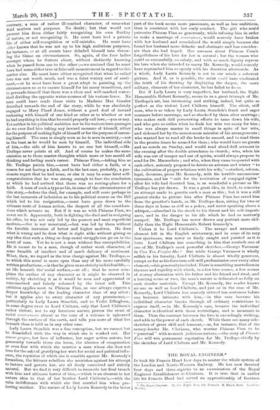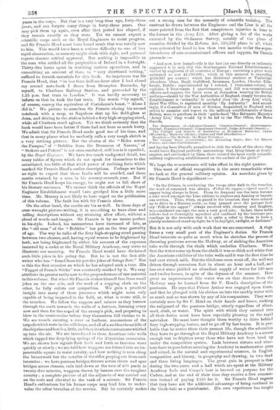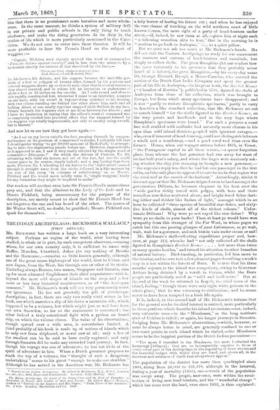THE ROYAL ENGINEER.* Fr took Sir Francis head four days
to master the whole system of the London and North-Western Railway. Ile has now devoted four days and three-eighths to an examination of the Royal Engineer Establishment at Chatham. It is true that in earlier life Sir Francis Head had served an apprenticeship of fourteen
years in the corps. But that is a very long time ago, forty-three years, and one forgets many things in forty-three years. One may pick them up again, even after that period has elapsed, if they remain exactly as they were. Yet we cannot expect a scientific corps such as the Royal Engineers to resist progress, and Sir Francis Head must have found much that was totally new to him. This would have been a serious difficulty to one of less rapid observation, as memory might clash with sight, and personal regrets obscure critical approval. But nothing is impossible to the man who settled all the perplexities of Ireland in a fortnight. Thirty-five hours spent in watching various operations, and in committing an account of them to " very shorthand writing," sufficed to furnish materials for this book. So impetuous was Sir Francis Head, that "in less than half-an-hour after I had closed my second note-book I drove from Brompton Barracks, by myself, to Chatham Railway Station, and proceeded by the 1.25 p.m. fast train to London." It was hardly necessary to inform us that he took the fast train. The words "by myself," of course, convey the equivalent of Coriolanus's boast, " Alone I did it." We picture to ourselves Sir Francis closing his second notebook with a snap, as Napoleon shut up his field-glass at Jena, and driving to the station behind a fiery high-stepping steed, while all Chatham stood aghast. Yet we think seriously that the book would have been better if there had not been so much hurry. We admit that Sir Francis Head made good use of his time, and that in many places what he modestly calls a very rough sketch is a very striking picture. But the charm of the " Rides across the Pampas," of " Bubbles from the Brunnens of Nassau," of " Stokers and Pokers" is not even emulated, still less is it equalled, by the Royal Engineer. We have too much undigested detail, too many tables of figures which do not speak for themselves to the uninitiated, too little of that vivid power of realizing facts which marked Sir Francis Head's earlier descriptions. Perhaps we have no right to expect that these faults will be avoided, and these merits retained, by a man in his seventy-seventh year. But if Sir Francis Head keeps his energy, he ought not to fall short of his literary successes. We cannot think the officials of the Royal Engineer Establishment would have grudged him a little more time. Mr. Murray is not likely to have urged on the publication of this volume. The fault lies with Sir Francis alone.
On the other hand, the merits ate his as well. In these days of over-wrought picture-writing, it is something to have clear and telling descriptions without any straining after effect, without a cloud of words and images. Sir Francis is by no means perfect in his style. Indeed, his mannerisms have increased of late, as the " old man " of the " Bubbles " has put on the true garrulity of age. The way he talks of the fiery high-stepping steed passing between two chasms, and, having equal reason to be frightened by both, not being frightened by either, his account of the expenses incurred by a cadet at the Royal Military Academy, may serve to illustrate our meaning. Sir Francis Head would have disdained such little jokes in his palmy day. But he is not the first able writer who has " found from his pen the jokes of dotage flow." Nor is this the first occasion on which he has adopted such a tone. His "Faggot of French Sticks" was constantly marked by it. We may attribute its greater rarity now to the preponderance of raw material in this volume. But when Sir Francis shakes himself free from small jokes on the one side, and the work of a copying clerk on the other, he fully enlists our sympathies. We gain a practical insight into many of those processes which might seem only capable of being imparted in the field, or, what is worse still, in the trenches. We follow the sappers and miners as they bUrrow through the earth towards the walls of a fortress, listening every now and then for the sound of the enemy's pick, and preparing to blow in the countermine before they themselves fall victims to it. We see vessels entering a river or harbour, unconscious of the torpedo which rests in the still deeps, and all of a sudden the middle of the shiprises and bends a little, and then its wholeconteuts are whirled up into the air. 1Ve are introduced to those American tube wells which tapped the deep-lying springs of the Abyssinian mountains. We are shown how signals flash back and forth as lanterns wave quickly or slowly ; we are told how waggons are formed into an impenetrable square to resist cavalry, and how nothing is seen along the breastwork but the muzzles of the rifles peeping out from each interstice ; we have pontoon bridges thrown across rivers and spar bridges across chasms, rails laid down at the rate of 400 yards iu twenty-five minutes, waggons drawn by lassoes over the roughest country ; a complete picture of all the adjuncts of war carried out on the scale and elevated to the rank of a science. Sir Francis Head's enthusiasm for his former corps may lead him to undervalue the other branches of the service. But he certainly makes out a strong case for the necessity of scientific training. The contrast he draws between the Engineers and the Line is all the more pointed from the fact that conspicuous injustice is done to the former in the Army List. After giving a list of the works executed by the Ordnance Survey, notably of the plans of counties divided by the Reform Act, 530,352 plans in all, which were coloured by hand iu less than two months under the superintendence of non-commissioned officers and sappers, Sir Francis proceeds :— " And now, how inexplicable is the fact (no one directly or indirectly suggested it to me), that this Southampton National Establishment—. visited by engineers of all countries of Europe ; executing a great work estimated to cost £1,850.000 ; which at this moment is expending £118.345 per annum ; which has divisional stations at Tunbridge, Aberdeen, Oban, Banff, Guildford, Inverness, London, Chester, Edinburgh, Dublin ; superintended by 1 colonel, 1 lieutenant-colonel, 14 captains, 2 lieutenants, 1 quartermaster, and 362 non-commissioned officers and sappers, the latter even at Jerusalem wearing the British uniform—should by the War Authorities of England, simply because the Establishment is 'scientific,' be excluded from the Army List,' which, dated War Office, is reprinted monthly By Authority !' And accordingly, if a Committee of men of Science, despatched, to England with orders to examine and report on the military establishments of Great Britain, were to purchase as their guide-book 'Her Britannic Majesty's Army List,' they would by it be led to the War Office, the Horse Guards,
The Departments of—Adjutant-General; Chaplain-General ; QuartermasterGeneral; Paymaster-General; Commissary-General; Judge-Advocate-General, The Colleges and Schools of Instruction at Brompton Barracks; Cadets (Woolwich); Musketry (Hythe); Cadets and Staff (Sandhurst),
Hospitals:—The Herbert; the Royal Victoria,—
The Cavalry Dell& (Canterbury) ; the Recruiting Depot; ditto for Reserve Forces; and other establishments ;
and having been liberally permitted to visit the whole of the above, they would leave England perfectly unconscious that, lying latent at Southampton, and overlooked by them, there existed the most costly scientific military engineering establishment on the surface of the globe !"
We hope the remonstrance will take effect in the right quarter. This want of official recognition is the more remarkable when
we look at the general military opinion. An anecdote given by Sir Francis Head is significant:— "In the Crimea, in conducting the troops after dark to the trenches, the word of command was always, 'Follow the sapper,—Quick march,' a sapper being always in front. From its frequent use the term became a cant word amongst the Line soldiers to express any dashing or hazardous service. Thus, when, on guard in the trenches, they were ordered up to drive in a Russian sortie, as they jumped over the parapet their cry 'Follow the sapper ! ' always received with cheering and laughter, was considered amongst the men a very good joke. In fact, these noble fellows feel so thoroughly mystified and confused by the intricate proceedings in the trenches that it is quite a relief to them to have a plainly understood stand-up fight, be it in daylight, twilight, or darkness."
But it is not only with such work that we are concerned. A siege forms a very small part of the Engineer's duties. Sir Francis Head interests us quite as much when he sketches the process of throwing pontoons across the Medway, or of sinking the American tube wells through the chalk which underlies Chatham. When first the water came up from the chalk it was so thick and white that the American exhibitor of the tube wells said it was the first time he had ever struck milk. But the thickness soon went off, the well was
driven through seventeen feet in about an hour and a half, and has ever since yielded an abundant supply of water for 120 men
and twelve horses, in spite of the dryness of the summer. How great an improvement this water was on that drawn from the Medway may be learned from Sir F. Head's description of the pontoons. He says that Prince Arthur was engaged upon them, and that he plunged with his clothes on into the muddy water with as much zeal as was shown by any of his companions. They were certainly seen by Sir F. Hehd on their hands and knees, racking the railguard of the pontoon bridge, utterly regardless of slime, mud, slush, or water. The spirit with which they entered into all their duties must have been especially pleasing to the rapid notetaker. He must have thought them worthy to drive behind fiery high-stepping horses, and to go off by fast trains. It is pro bable that he envies them their present life, though the education they have to go through at the Royal Military Academy is a severe enough test to frighten away those who have not been bred up under the competitive system. Lads between sixteen and nineteen have to pass before entering the Academy in mathematics pure and mixed, in the natural and experimental sciences, in English composition and history, in geography and drawing, in two dead and three living languages. The great gain in prospect is that during the two years and a half which are spent at the Military Academy Iude and Coope's beer is brewed on purpose for the Cadets, and at the end of their time they receive a free commission instead of paying £450 for it. Sir Francis Head regrets that they have not the additional advantage of being confined in the black-hole as a punishment. His own experience has taught him that there is no punishment more harmless and more wholesome. In the same manner, he thinks a system of military drill in our private and public schools is the only thing to teach obedience, and make the rising generation do its duty in the station of life which is more particularly mentioned in the Cate chism. We do not care to enter into these theories. It will be more profitable to hear Sir Francis Head on the subject of waggons :
° Captain Micklem very sharply uttered the word of command— 'Form for defence against cavalry!' and in less than two minutes, by a movement exactly the reverse of that described by the lines,— he, his horses, his drivers, and his sappers became the invisible garrison of a fort or polygon of twenty sides, formed by his pontoon and covered waggons drawn up so close to each other that in several instances they almost touched, and in others left an interstice or embrasure of about a foot or 18 inches on the outside. As I rode round and close to this rapidly constructed fort, whenever I came to an interstice, a sapper on one knee, with his sword in bayonet-form attached to his firearm, with two others standing one behind the other above him, each and all looking direct at me, nearly together snapped their Snidors in my face. Others beneath the waggons shot at me from between the wheels ; and I have no hesitation in saying that the officer's word of command was so completely carried into practical effect that the rampart formed by his waggons was totally impenetrable, not only to cavalry using swords, but to lancers."
And now let us see how they get loose again :
"As I sat on my horse outside the fort, peeping through its waggonembrasures at its garrison of compressed centaurs, I certainly felt that I should prefer trying to get 20,000 men out of Hyde Park,' to attempting to undo the engineering puzzle before me. However, impracticable as it appeared to me, I saw it very easily effected by the simple word of command—Disengage!' On which the drivers of Pontoon No. 20, advancing with their six horses, not out of the fort, but into the small vacant space in its centre, simply halted ; and a gap having thus been made, Pontoon No. 1, wheeling its six horses to the right-about,' moved through it straight away from the circle, followed in a like manner by the rest of the troop in columns of subdivisions,' or, as Messrs. Pickford and Co. would more mildly term it, 'single waggons,' ready for any formation they might bo required to make."
Our readers will see that even here Sir Francis Head's mannerisms peep out, and that the allusions to the Lady of the Lake and to Messrs. Pickford, being unneccessary for the purpose of the description, are merely meant to show that Sir Francis Head has not forgotten the one and has heard of the other. The manes of Sir Walter Scott will, no doubt, be gratified ; Messrs. Pickford can speak for themselves. •




































 Previous page
Previous page